Breast and Nipple Care
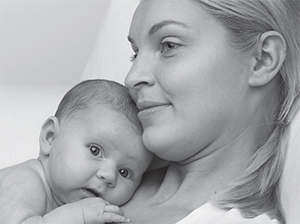
Prevention and Treatment of Sore Nipples
Breastfeeding is meant to be a comfortable and pleasant experience. When you are first getting started with breastfeeding, you may feel awkward – that is common. It will take some practice and patience to get relaxed. Remember, both you and your baby are learning a new skill.
Breastfeeding is not supposed to hurt, but many new mothers find that in the first week or two of nursing, they may experience nipple tenderness and soreness. This is normal and will improve as the baby gets better at nursing.
The key to comfortable breastfeeding is getting the baby attached (or latched) to the breast correctly with your nipple deep into his mouth. The way your baby latches and the positions in which you nurse can help prevent sore nipples. If your nipples are already sore, a proper latch and good positioning will help them heal a little bit faster. It is also helpful to contact a lactation consultant or healthcare professional to assist you in comfortable breastfeeding techniques.
Positioning and Latch Technique
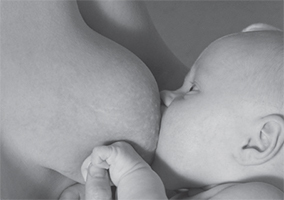
- You and your baby should be in a comfortable position.
- You may find it helpful to use some pillows to support your arm.
- Hold your baby so he is facing you and your breast. His ear, shoulder and neck should be in a straight line.
- Hold your breast with your thumb on top of your breast and fingers below, well away from the areola (darker part surrounding the nipple).
- Pointing the nipple upward, tickle his lip until he opens his mouth wide. Be patient , sometimes this takes a minute or two.
- Bring baby’s chin into your breast and pull him close so he takes in a big mouthful of breast.
- Keep baby’s body pressed close to yours. This allows the nipple to stay deep in the baby’s mouth.
It’s OK if baby’s nose touches the breast.
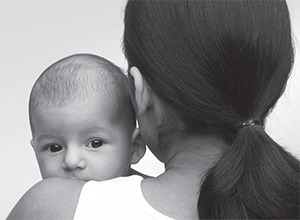
- After the first few sucks, you should feel a tug at the breast, but no pain. (In the first few days the latch itself may hurt a bit, but the discomfort should ease over time.)
Signs of a Good Latch
- Baby sucks actively at the breast.
- Mouth is opened wide.
- Lips are flanged outward (like a rosebud).
- You may hear swallowing.
- Baby’s chin is touching your breast (nose may also be touching).
- Baby’s ear, shoulder and hip are in a straight line and baby’s body is facing you.
- You should feel a tugging at the breast but no “toe-curling” pain after the first few sucks.
If your Nipples are Already Sore
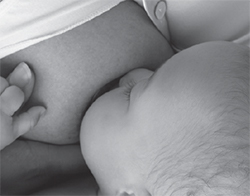
- You may want to begin the feeding on the side that hurts less.
- Massage your breast for a minute or two before breastfeeding to stimulate the milk flow before baby latches on.
- If your breasts are full or firm, express some milk to soften the breast and make it easier for the baby to get the breast and nipple far back into his mouth.
- Make sure the baby is positioned properly with a wide open mouth and has hold of a large mouthful of breast. If baby is sucking on the nipple only, this can be extremely painful and your nipple may become damaged.
- For pain relief, you can apply Tender Care™ lanolin on your nipples and areola after feeding to soothe the tender skin.
- If your nipples are very sore or there is a break in the skin, a moist environment is recommended for optimal healing. Tender Care Hydrogel pads provide immediate cool and soothing pain relief and promote tissue healing. The pads are placed over the nipple and worn inside the bra between feedings. Tender Care lanolin can also be used with the Hydrogel pads if needed.
- SoftShells™ for sore nipples can be worn inside your bra between feedings to allow air to circulate and protect the tender nipples from rubbing on the fabric
- If you have tried these comfort measures for a few days and nipple pain increases or you see bleeding or cracks, call a lactation consultant or healthcare professional for assistance.
Helpful Hints
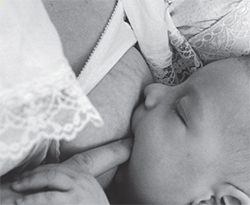
- When removing baby from the breast, remember to first break the suction by inserting a clean finger into the baby’s mouth between the gums and holding it there while pulling him away.
- Breastfeed frequently (8-12 times in 24 hours). Watch for early feeding cues such as gentle stirring, being awake and alert, putting his hand to his mouth, etc. It is a good idea to try to breastfeed when baby is calm and alert, before he is crying and upset.
- Wait until breastfeeding is well established before introducing bottles and pacifiers.
- Keep bras and bra pads clean and dry.
Resources
Go to Medela for products and information available for you and your baby.
To locate Medela products or a breastfeeding specialist in your area, go to Medela or call 1-(800) TELL YOU, 24 hours a day, 7 days a week.
Some other excellent resources:
- International Lactation Consultant Association
- La Leche League International
- United States Lactation Consultant Association
Medela, Inc.,
P.O. Box 660
1101 Corporate Drive
McHenry, IL, 60051-0660
Medela Canada, Inc.,
4160 Sladeview, Crescent Unit #8
Mississauga, ON L5L OA1
Phone: (800) 435-8316 or (815) 363-1166
Fax: (815) 363-1246
Medela